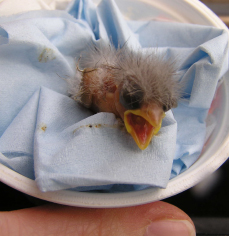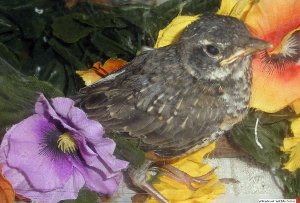If You Find a Baby Bird
Please read this information to decide what to do when you find a baby bird:

Nestlings are baby birds that should still be in the nest.
- They do not have complete feathers and show many areas of bare skin
- Their eyes may not be opened
- They do not stand or hop well
Attempt to return this type of bird to its correct nest or call a wildlife rehabilitation center for information on how to create a substitute nest for a fallen bird.
Observe bird /nest from a distance to see if parents return.
Touching a baby bird to return it to safety will not cause the parents to abandon it! Birds have strong parental instincts and will seek their babies to care for them.

Fledglings are young, fully feathered birds that are too big for the nest.
- They have left the nest, jumped to the ground and move about being fed by parents who visit them occasionally
- Fledglings are not able to fly, initially
- These birds hop/hide/live on the ground (often spending long periods of time alone) until they grow stronger and become flighted
A fledgling that is not injured should stay in the wild — even if it is on the ground and appears to be abandoned. As long as it is fully feathered, mobile, and alert, a fledgling that shows no bleeding, disfigured/injured body parts, or weakness should be left alone. Living on the ground is a natural and dangerous stage of life for baby birds but in most cases they are being cared for by their family and living in the outdoors where they belong.
If the bird is in a place that is safe from cats, dogs and people — leave it alone.
If the bird is in a dangerous area, you may attempt to move it to a safer location — a nearby bush, ground cover, or tree branch — and watch for parents.
Although the grounded fledglings are at risk from natural predators (raccoons, skunks, etc.) a far greater—and preventable—cause of death is predation by domestic cats. Read more on our Cats page.
NO ONE WILL CHECK OR RESPOND TO AN EMAIL OR TEXT - TO REPORT AN INJURED BIRD - CALL 773 988 1867

